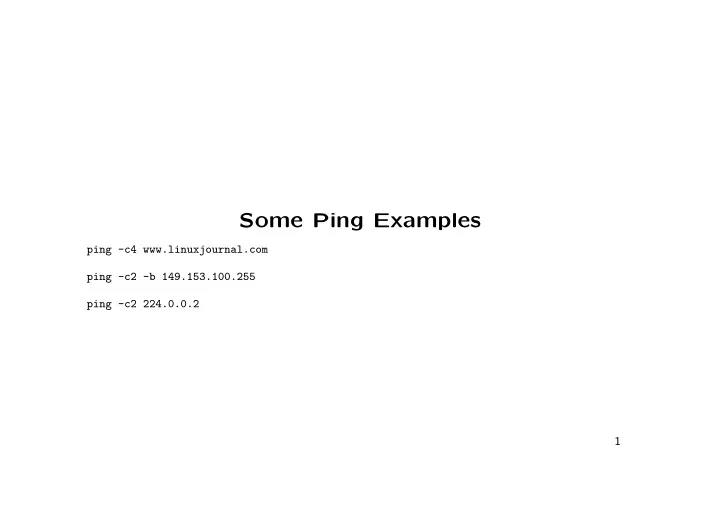

Some Ping Examples ping -c4 www.linuxjournal.com ping -c2 -b 149.153.100.255 ping -c2 224.0.0.2 1
Doing the Net::Ping Thing, 1 of 2 #! /usr/bin/perl -w use strict; use Net::Ping; my $host = shift || ’localhost’; my @protos = qw( icmp tcp udp ); 2
Doing the Net::Ping Thing, 2 of 2 foreach my $proto ( @protos ) { if ( ( $proto eq ’icmp’ ) and ( $> ) ) { print "multiping: ’icmp’ only available to root.\n"; next; } my $pinger = Net::Ping->new( $proto ); if ( $pinger->ping( $host ) ) { print "$host is alive to ’$proto’ pinging.\n"; } else { print "$host did not respond to ’$proto’ pinging.\n"; } $pinger->close; } 3
Tracing Routes traceroute www.linuxjournal.com The CPAN Net::Traceroute module for Perl automates the processing of the results generated by traceroute . A general understanding of how traceroute works is important. 4
Getting Ready To Work With SNMP The Simple Network Management Protocol The Net::SNMP module from CPAN allows Perl programmers to interact with Managed Devices (or Agents). See the installation instructions on the next page. If access to SNMP devices is not available on the local network (perhaps due to security concerns), an SNMP implementation can be installed in order to test any developed SNMP programs. Such an implementation is available at: http://www.net-snmp.org Download and install this technology into Linux. 5
Installing The Net::SNMP Module gunzip Net-SNMP-3.60.tar.gz tar xvf Net-SNMP-3.60.tar cd Net-SNMP-3.6 perl Makefile.PL make make test su make install <ctrl-D> man Net::SNMP perl -e ’use Net::SNMP’ 6
udpstats: Working With Net::SNMP , 1 of 2 ./udpstats 149.153.100.253 xxxxxx Requesting ’udp’ group data for: 149.153.100.253, xxxxxx, SNMPv2 UDP instance values: 1.3.6.1.2.1.7.1.0 => 18821809 1.3.6.1.2.1.7.2.0 => 5303516 1.3.6.1.2.1.7.3.0 => 1 1.3.6.1.2.1.7.4.0 => 10495825 7
udpstats: Working With Net::SNMP , 2 of 2 UDP table values: 1.3.6.1.2.1.7.5.1.1.149.153.1.253.496 => 149.153.1.253 1.3.6.1.2.1.7.5.1.1.149.153.1.253.520 => 149.153.1.253 1.3.6.1.2.1.7.5.1.1.149.153.1.253.1985 => 149.153.1.253 1.3.6.1.2.1.7.5.1.1.149.153.2.253.49 => 149.153.2.253 1.3.6.1.2.1.7.5.1.1.149.153.2.253.51505 => 149.153.2.253 1.3.6.1.2.1.7.5.1.1.149.153.2.253.56134 => 149.153.2.253 1.3.6.1.2.1.7.5.1.1.149.153.100.253.67 => 149.153.100.253 1.3.6.1.2.1.7.5.1.1.149.153.100.253.161 => 149.153.100.253 1.3.6.1.2.1.7.5.1.2.149.153.1.253.496 => 496 1.3.6.1.2.1.7.5.1.2.149.153.1.253.520 => 520 1.3.6.1.2.1.7.5.1.2.149.153.1.253.1985 => 1985 1.3.6.1.2.1.7.5.1.2.149.153.2.253.49 => 49 1.3.6.1.2.1.7.5.1.2.149.153.2.253.51505 => 51505 1.3.6.1.2.1.7.5.1.2.149.153.2.253.56134 => 56134 1.3.6.1.2.1.7.5.1.2.149.153.100.253.67 => 67 1.3.6.1.2.1.7.5.1.2.149.153.100.253.161 => 161 8
Working With Mnemonic Object Identifiers The OIDs.pm Module use OIDs qw( sysUpTime ipForwarding udpInDatagrams ); use OIDs qw( :interfaces ); use OIDs qw( :tcp :udp ifNumber ); 9
The udpstats Source Code, 1 of 5 #! /usr/bin/perl -w use strict; use Socket; use Net::SNMP qw( oid_lex_sort ); use OIDs qw( :udp ); my $snmp_host = shift || ’localhost’; my $snmp_community = shift || ’public’; my $snmp_version = shift || ’2’; my $snmp_port = shift || 161; 10
The udpstats Source Code, 2 of 5 $snmp_host = inet_ntoa( scalar gethostbyname( $snmp_host ) ); print "Requesting ’udp’ group data for: $snmp_host, "; print "$snmp_community, SNMPv$snmp_version\n\n"; my ( $snmp_session, $snmp_error ) = Net::SNMP->session( -hostname => $snmp_host, -community => $snmp_community, -version => $snmp_version, -port => $snmp_port, -debug => 0 ); if ( !defined( $snmp_session ) ) { die "udpstats: an error occurred: ", $snmp_error, "\n"; } 11
The udpstats Source Code, 3 of 5 my @udpOIDs = ( udpInDatagrams, udpNoPorts, udpInErrors, udpOutDatagrams ); my $responsePDU = $snmp_session->get_request( @udpOIDs ); if ( !defined( $responsePDU ) ) { warn "udpstats: ", $snmp_session->error, "\n"; } print "UDP instance values:\n\n"; foreach my $resp ( oid_lex_sort ( keys %{ $responsePDU } ) ) { print "$resp => ", $responsePDU->{ $resp }, "\n"; } 12
The udpstats Source Code, 4 of 5 print "\nUDP table values:\n\n"; udp_get_table( $snmp_session, udpTable ); $snmp_session->close; 13
The udpstats Source Code, 5 of 5 sub udp_get_table { my ( $sess, $requestOID ) = @_; my $responsePDU = $sess->get_table( $requestOID ); if ( !defined( $responsePDU ) ) { print "udpstats: OID: ", $requestOID, " : ", $sess->error, "\n"; } foreach my $resp ( oid_lex_sort ( keys %{ $responsePDU } ) ) { print "$resp => ", $responsePDU->{ $resp }, "\n"; } print "\n"; } 14
Recommend
More recommend